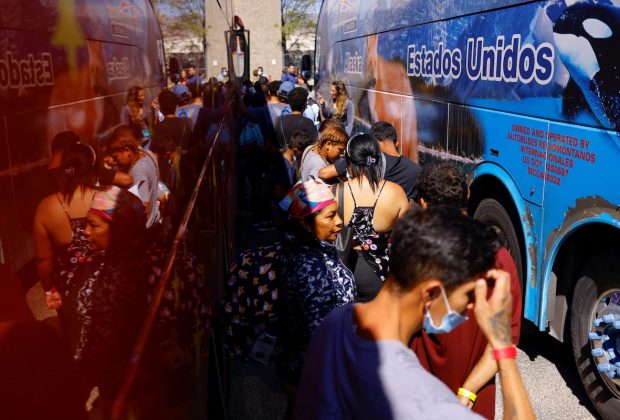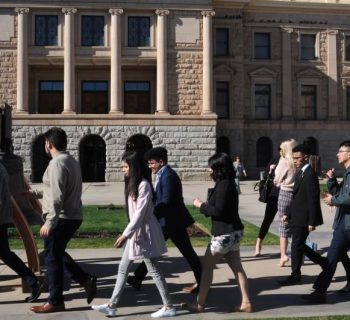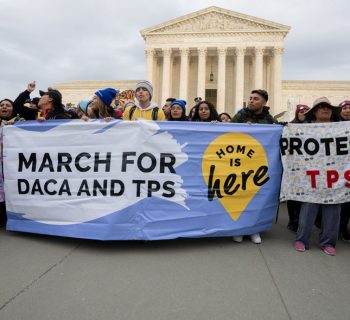Eric Holcomb, a Republican, is governor of Indiana. Spencer Cox, a Republican, is governor of Utah.
Opinion by Eric Holcomb & Spencer Cox | The Washington Post | FEB. 21, 2023 | Photo by Jose Luis Gonzalez
Indiana has about 220,000 open jobs right now and Utah has 107,000, according to the most recent federal data — more than 6 percent of all jobs in both states. With strong business and tax environments, we like our chances in the competition for job-seekers moving from other states. But they won’t be enough to fill all of those vacancies. We also need immigrants who are ready to work and help build strong communities.
To help us do our jobs as governors, we call on Congress to end its two-decade standoff on setting immigration policy — one of its most basic duties. And, as leaders of states, we pledge to share the accountability. Though border security is a national concern, and a nonnegotiable requirement of national security in a world with drug cartels and terrorists, we believe that states should be able to sponsor whatever immigrants serve the needs of their communities. As it is, the standstill on immigration hobbles both parties and, more seriously, endangers America’s long-term well-being.
A growing, bipartisan group of senators appears to share our sense of urgency. But voices on one side call for an overly liberal national immigration policy that overlooks the toll on border states and encourages too many people to take dangerous journeys that can end in legal limbo. Meanwhile, voices on the other side call immigrants a burden, against all the evidence from economics and history.
The United States became prosperous because many immigrants saw our beacon and seized the freedoms and opportunities offered here. That formula has not changed. As of 2021, for example, nearly half of America’s Fortune 500 companies had been founded by an immigrantor the child of one.
At home, we see more ordinary stories of immigrants contributing to our state economies. Julian Diaz entered the United States in search of work in the 1990s. His son Juan now employs four other Hoosiers in a successful landscaping business, while Juan’s son studies computer science in college. Bassam Salem, born in Egypt, came to the United States more than 30 years ago with his parents and grew up in Utah. He eventually secured permanent residency, became a U.S. citizen and founded two successful technology start-ups that have contributed millions to the economy.
Rapidly declining birthrates and accelerating retirements across the United States mean that our states’ already wide job gaps will grow to crisis proportions without more families such as these — causing our growth engines to sputter. Many of these jobs require high-level skills and entrepreneurship. But states are also awash in unfilled entry-level, low-skill roles — essential in agriculture, health care and the service industries.
So, count us as supporters of immigration sponsorship by the states. Under such authority, similar to what employers and universities have already, each state could make its own decisions. They could sponsor no visas or many visas each year, up to a limit set by Congress, for the specific sorts of jobs they need to fill.
Immigration sponsorship would give states a dynamic means to attract new residents, both from a pool of new applicants from abroad and from the ranks of current asylum seekers. The policy would also expand the states’ responsibility for the contributions and success of these folks in American life.
Washington would need to grant us such authority. And, of course, that’s not the only task on Washington’s list after two decades of punting. There is no way to approach immigration without three basic components: rules to determine who can come in and how, and who can stay; unflinching enforcement of such rules; and some kind of review-and-repeat process to assure that the United States offers paths to citizenship based on our evolving needs. The rules must include a practical approach to illegal immigrants who came to this country as children. And enforcement must include firm control of all entry points.
Perhaps it will help our representatives in Washington to know that governors and many other people back home in the states have their backs. The two of us are not unicorns, and last week’s National Governors Association meeting encouraged us to believe that others will soon step up, as well.
Our southwestern states bear the brunt of today’s immigration catastrophe, which forces those states to house, clothe and feed an unrelenting stream of people. But in meaningful ways, every U.S. state shares a border with the rest of the world, and all of them need investment, markets and workers from abroad. That border can remain an embarrassment, or it can become a big asset to us once again.







